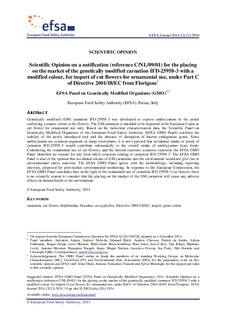Scientific Opinion on a notification (reference C/NL/09/01) for the placing on the market of the genetically modified carnation IFD-25958-3 with a modified colour, for import of cut flowers for ornamental use, under Part C of Directive 2001/18/EC from Florigene
Arpaia, Salvatore; Birch, Nicholas; Chesson, Andrew; du Jardin, Patrick; Gathmann, Achim; Gropp, Jürgen; Herman, Lieve; Hoen-Sorteberg, Hilde-Gunn; Jones, Huw; Kiss, József; Kleter, Gijs; Løvik, Martinus; Messean, Antoine; Naegeli, Hanspeter; Nielsen, Kåre Magne; Ovesna, Jaroslava; Perry, Joe; Rostoks, Nils; Tebbe, Christoph
Journal article

Åpne
Permanent lenke
http://hdl.handle.net/11250/2375353Utgivelsesdato
2014Metadata
Vis full innførselSamlinger
Sammendrag
Genetically modified (GM) carnation IFD-25958-3 was developed to express anthocyanins in the petals conferring a mauve colour to the flowers. The GM carnation is intended to be imported in the European Union as cut flower for ornamental use only. Based on the molecular characterisation data, the Scientific Panel on Genetically Modified Organisms of the European Food Safety Authority (EFSA GMO Panel) confirms the stability of the newly introduced trait and the absence of disruption of known endogenous genes. Since anthocyanins are common pigments in many food plants, it is not expected that accidental intake of petals of carnation IFD-25958-3 would contribute substantially to the overall intake of anthocyanins from foods. Considering the ornamental use of cut flowers, and the limited exposure scenarios expected, the EFSA GMO Panel identified no reasons for any food safety concerns relating to carnation IFD-25958-3. The EFSA GMO Panel is also of the opinion that accidental release of GM carnations into the environment would not give rise to environmental safety concerns. The EFSA GMO Panel agrees with the methodology, including reporting intervals, proposed for post-market environmental monitoring. In response to the European Commission, the EFSA GMO Panel concludes that, in the light of the ornamental use of carnation IFD-25958-3 cut flowers, there is no scientific reason to consider that the placing on the market of the GM carnation will cause any adverse effects on human health or the environment.